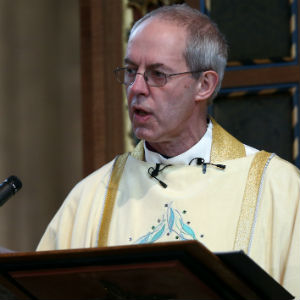Campaigners: Church of England discrimination against gay clergy ‘must not continue’

After a gay hospital chaplain who was sacked for getting married lost his tribunal, a gay Christian group has said the Church of England’s discrimination must be addressed.
Canon Jeremy Pemberton was the first member of the Church of England clergy to enter into a same-sex marriage, when he wed his partner Laurence Cunnington last April.
His marriage defied a decision by the House of Bishops, which has banned gay clergy from marrying – and he later had his permission to officiate revoked by a Bishop. This meant he was prevented from taking up a job, as he was declined the correct licences.
Canon Pemberton filed an Equality Act claim in the Employment Tribunal, alleging that the Church had discriminated against him because of his sexuality – but the tribunal this week found against him.
The tribunal found that equality laws did not apply because “the claimant knowingly entered into that marriage and knew what the potential consequences could be for him”, and that “[he] would never have been in this position had he not defied the doctrine of the Church”.
Mr Pemberton said: “I am disappointed, but my lawyers are preparing Grounds of appeal.”
In a statement to PinkNews, Tracey Byrne of the Lesbian and Gay Christian Movement spoke about the decision.
She said: “Many will naturally be disappointed that Jeremy’s claim has been unsuccessful; this has been an enormously brave and personally costly process for both him and Laurence, for their legal team and many supporters.

“They have conducted themselves with the utmost dignity and grace.”
“What Jeremy has done is to call church leaders to account publically for their actions.
“If the outcome of this case is that people are now aware of the ways in which the Church of England can indeed legally discriminate against gay and lesbian people who want to do nothing more ordinary than fall in love and marry, I hope people will sit up and take notice.
“Is this the kind of established church we want? One which is allowed to discriminate?
“Is the NHS really going to continue to allow the Church of England to dictate who it can employ? Is this really what equality legislation is designed to do?”
She added:”As hard as is it to hear how gay and lesbian people continue to be treated by the church, admitting we have a problem, bringing it out into the open as Jeremy’s case has done, will be a huge driver for change.
“That’s what we’re committed to doing, for as long as it takes.”
Rights campaigner Peter Tatchell said: “This decision sets three dangerous precedents: that the Church of England is exempt from the laws prohibiting workplace discrimination; that it is entitled to discriminate against gay clergy who have been lawfully married in a civil ceremony; and that it can lawfully dictate to non-religious institutions, such as the NHS, who they can employ.
“This contradicts the principles of the Equality Act 2010. It gives a green light to Bishops across Britain to witch-hunt married gay clergy.
“This strikes me as a clear case of employment discrimination. The Church of England has no right to seek exemption from the anti-discrimination laws that apply to everyone else.
He continued: “It is disgraceful homophobia to deprive a priest of his right to work because he married the man he loves. Discrimination is not a Christian value.
“Jeremy sought appointment to a job in the NHS. It is not reasonable for the Church of England to dictate to the NHS who it can employ.
“Just because the Church of England treats lesbian, gay, bisexual and transgender (LGBT) clergy as second class Christians this is no excuse for it to impose its anti-gay discrimination on non-church institutions.”
Andrew Copson, Chief Executive of the British Humanist Association, commented: “Paid posts providing pastoral care in NHS bodies should be open to all applicants without any religious restrictions and what this ruling demonstrates is the harm that can be done by allowing these restrictions.
“Had Jeremy been employed on that basis and he faced discrimination because of his sexuality, then the outcome of the case today would have been very different.”
Keith Porteous Wood of the NAtioanl Secular Society said: “It is reasonable for a hospital trust employing a chaplain acting on behalf of a religious body to require that body’s authorisation.
“Nevertheless, the judgment acknowledged that ‘The Church cannot impose upon the Trust one of its priests as a chaplain’ and that a chaplain could be secular.
“Patients are not entitled to require the hospital to provide at its expense a cleric from any particular denomination or religion. In doing so it has resulted in discrimination involving a publicly funded post, whether or not this is technically in breach of the Trusts’ public authority equality duty.
“Future chaplaincy appointments should not be contingent on them being licensed by any religious body. Instead these publicly-funded appointments should be made open all, regardless of religion or belief or sexual orientation.”

